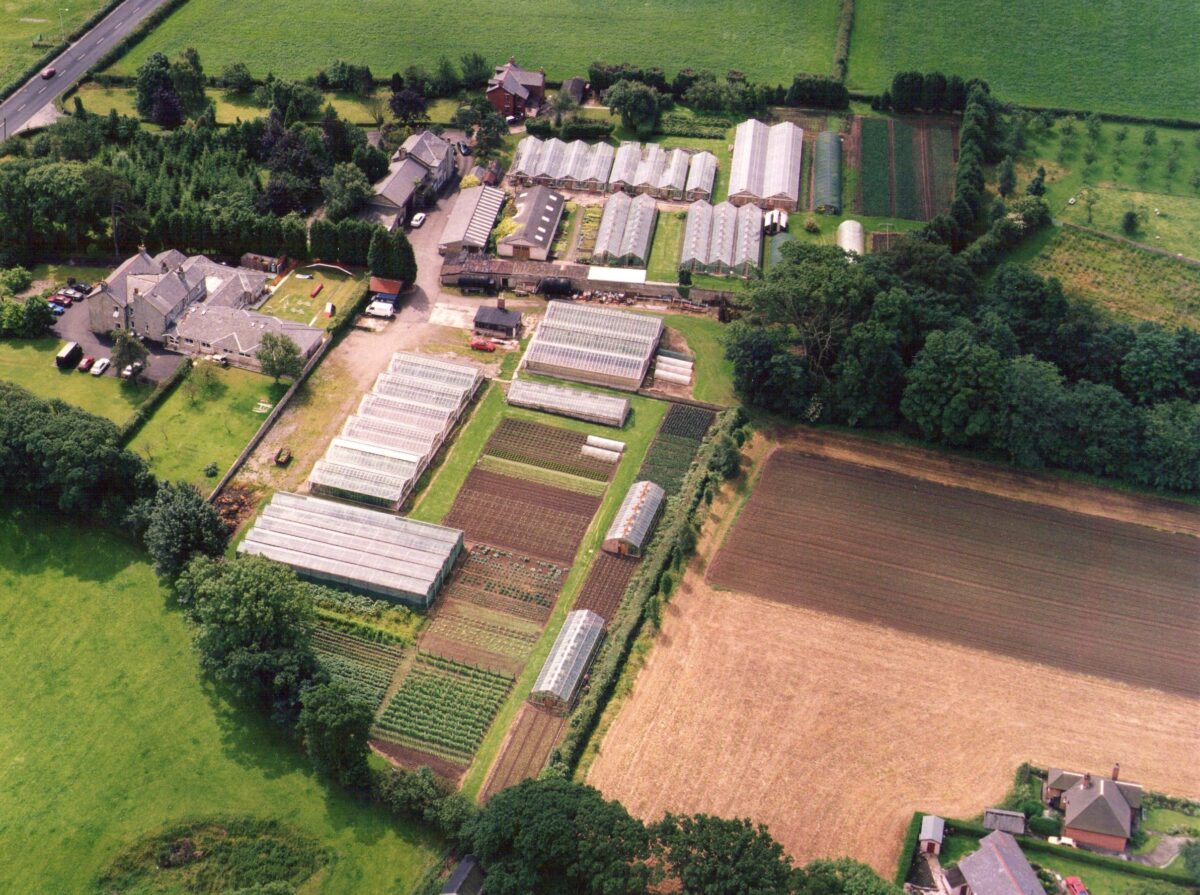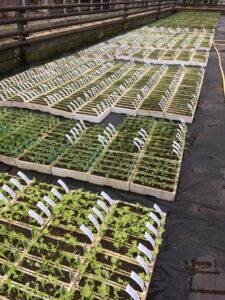This website uses cookies so that we can provide you with the best user experience possible. Cookie information is stored in your browser and performs functions such as recognising you when you return to our website and helping our team to understand which sections of the website you find most interesting and useful.

Welcome to our web site nursery news
On these pages we update all what is going on at the nursery and keep you up to date on the seasons growing with monthly hints and tips.
For updates on the shows and dates for 2024 see News about our Shows.
If trying trying ‘Grow your Own’ for the first time, don’t be put off by a failure. As we have always said, each year is different, so never be put off by a bad years results. There is always next year, gardeners are optimists. There is always our facebook page to check for daily updates and each monthly mail shots for more information on growing month by month.
There is a Chinese saying which says:
To be happy for a short time; get drunk, happy for a long time; fall in love, happy forever; take up gardening.
Nature is unstoppable.
As always the nursery is open for the collection of all your vegetable plants as the seasons progress.
All our plants are grown using John Innes compost which is loam based. We use biomass boilers to heat all our glasshouses and use predator’s or a natural spray to control unwanted garden pests rather than a chemical spray.
We are committed to following the advice from the experts to deliver the highest standards of safety and hygiene for our staff and customers.
We regret we cannot send any plants to Northern Ireland or the EU.
Available now at the nursery we have
Vegetable seedlings including the
Mammoth Onion and Mammoth Leeks
Tomato, Chilli, Sweet Pepper, Aubergine, Cucumber, Brassica, Lettuce and herb plants available.
Seed Potatoes, Onion and Shallot sets.
Spring planting Garlic, including some ready started plants.
Rhubarb Crowns. Strawberry plants.
Our full range of seeds
April nursery opening times
Monday to Friday 10am to 4pm
SATURDAY AND SUNDAY 10m to 4pm
Jobs in the garden for April here in the UK
Dear Gardeners,
April is a busy month. For many gardeners the planning starts now. If the intention is to exhibit anything in a local show the groundwork starts in April. Most shows are back on track this year but do need the support of exhibitors and visitors to succeed. For the list of shows we are attending this year please check out the News pages on our website.
Try to have all the beds prepared even if you don’t plant anything yet. This allows you to control the weeds before the crops go in. Give the prepared beds a sprinkle of general fertilizer and rake it in. Keep an eye out for slugs; they are starting to get busy. The soil is drying out and starting to warm up but it is still early to sow directly outside for French and Runner beans. However you will be very busy sowing seeds indoors filling the greenhouse with seed trays, such a good place to be on a wet day.
Outdoor sowing and planting:
The only vegetables we sow directly outdoors in April are early Peas, Broad Beans, Beetroot, Turnips and early Radish. If you haven’t got enough propagation space you can sow Spinach and Chard directly outside instead of raising it in modules but better results are obtained by sowing in pots first.
Mid April is a good time to plant potatoes. If you haven’t planted your onion and shallot sets yet you can still plant them now. In the warmer parts of the country sow early carrots, beetroot and parsnips. Most root vegetables can be sown in succession until late May/June.
Indoor sowing:
Seeds which can be sown indoors include winter Leeks, Cabbage, Cauliflower, Brussels Sprouts, Calabrese, Kale, Kohlrabi, Rocket, Swede, Turnip, Lettuce, Perpetual Spinach, Chard, and herbs such as Basil, Coriander, Parsley and Dill.
Indoor sowing with overnight warmth:
Tomatoes for planting outdoors, Courgette, Pumpkin, Squash, Cucumbers, French bean, Runner bean and Sweetcorn can be sown in readiness for a May planting.
Planting outside:
Now is the time to plant the Mammoth Onions and Mammoth Leeks. Onions are more hardy than leeks when young so plant the onions first then the leeks second. Water well after planting especially if planting under cover. Plant firm, we have never in our 150 years of growing large onions needed to stake the leaves. They are self supporting. For UK residents we are starting to despatch the Onion and Leek plants to customers in the south of the UK from April 8th, they are hardened off ready to plant.
Planting inside:
Tomatoes, Peppers and Chillies can be planted in a cold greenhouse from mid April and Cucumbers from the end of the month.
Why not try… Beetroot.
Beets are fantastically good for you. They contain a host of chemicals and compounds that are thought to improve cardiovascular health, protect against liver disease, regulate stomach acidity, and lower blood pressure. They are rich in foliate, vitamins B and C, and potassium. They can be harvested for their baby leaves as salad greens, and for their sweet, crunchy roots. These can be enjoyed as baby beets, or grown on to mature size for winter storage. The roots are peeled and then steamed or sliced and sautéed as a delicious vegetable dish. Many people enjoy them raw with vinegar. The pairing of sour vinegar and sweet beetroot makes them prime candidates for pickling. The golden beetroot is sweet and tasty eaten raw in salads. They can also be fermented to make a very tasty wine, and of course, they are the key ingredient in borscht.
For our local UK customers the nursery will be open each day from 10am to 4pm.
Whatever the weather,
Good gardening,
The Robinsons
W Robinson & Son (Seeds and Plants) Ltd
‘The Home of the Mammoth Onion’
Sunny Bank, Forton, Preston
PR3 0BN
01524791210
www.mammothonion.co.uk
e: [email protected]
facebook.com/mammothvegetables
A pest solution.
Now that conditions are correct for planting leafy vegetables slugs can be a problem. Use this simple garlic repellent to deter garden pests like aphids and slugs. It can also help eliminate powdery mildew on foliage.
Peel the cloves from a whole head of garlic and put in a food processor or blender with 235 ml of water. Purée the mixture (this takes about a minute in a regular food processor). Alternatively, chop or crush the cloves as finely as you can by hand and mix well with the water.
Add a further 700ml of water to the mix, along with 30ml of any liquid soap. Blend again and then transfer to a clean jar.
Leave the mixture to steep overnight, or for at least 12 hours, so that the garlic can infuse the liquid with its potent sulphur compounds.
Once the mixture has had time to steep, strain it through a muslin cloth or fine mesh strainer to remove the solid garlic pieces (which would otherwise clog the nozzle on your spray bottle).
Pour the garlic-infused liquid into a reusable spray bottle and store in the fridge between uses.
Mist plants in the evening, holding the spray about 15-30cm away from the foliage, and cover both sides of the leaves with an even coating of the garlic pesticide spray. Re-apply every few days (and after any rainfall) when your plants are suffering with an infestation, or once a week as a deterrent.
Garlic has a reputation for warding off vampires but it’s also effective against smaller blood-sucking creatures such as mosquitoes.
Add two-three crushed fresh garlic cloves to a food grade oil such as sunflower oil and leave to infuse for 24 hours.
The following day, add 1 teaspoon of fresh lemon juice to the mixture, along with 500 ml water.
Strain the garlic, lemon and oil mixture through some muslin cloth or a fine mesh strainer to remove the pieces of garlic.
Transfer to a spray bottle and apply this natural repellent as needed to keep mosquitoes away.


Below is a guide for when to feed vegetables which we hope will be of help.
GENERAL RULES FOR FEEDING VEGETABLES.
All root vegetables….. Never. If the ground is correctly prepared.
Brassica…… Never. If the ground is correctly prepared
Chilli Peppers….. When the fruit has started to set and swell well, never feed too early.
Courgettes, Marrows and Cucumbers…… When first picking starts.
Onions and Leeks……. Never. If the ground is correctly prepared.
Onions and Leeks for exhibition……. Never. If the ground is correctly prepared. However they respond to a feed of Nitrate of Soda if a burst of growth is needed.
Peppers and Aubergines…….. When fruit is golf ball size.
Tomatoes under glass……. When the fruit on the first truss is pea size.
Tomatoes outdoors…….. When the fruit on the second truss is pea size.
NEVER FORGET PLANTS DON’T HAVE TEETH, THEY DO NEED WATER TO TAKE UP THE NUTRIENTS IN THE GROUND! ALWAYS WATER THE GROUND WELL IN HOT DRY CONDITIONS.
W Robinson & Son (Seeds and Plants) Ltd
‘The Home of the Mammoth Onion’
Sunny Bank, Forton, Preston PR3 0BN
01524791210
www.mammothonion.co.uk [email protected]
facebook.com/mammothvegetables
